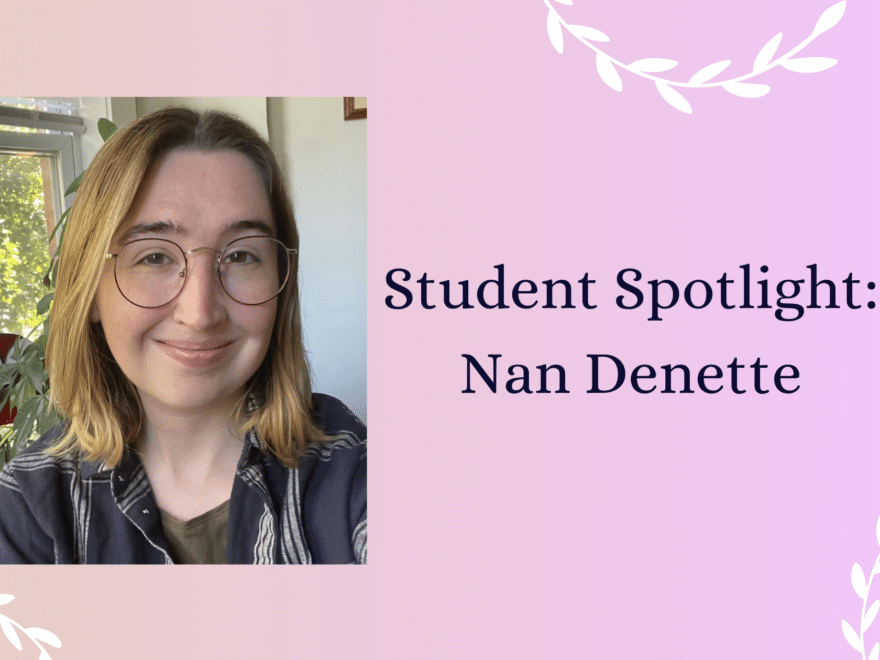This October, MAWRD student Nan Denette presented at a conference at the University of Memphis, discussing her findings on how we can use existential rhetoric to more effectively combat climate change. Learn more about her fascinating work through this exclusive interview, where she discusses not just her research but her experience presenting.

What topic did you present on and what inspired you to present on it?
My presentation was titled “Anthropos & Anthropocene: Existential Rhetorics in the Age of Ecological Disaster.” I focused on two fictional texts—Paradise Lost by John Milton and White Noise by Don DeLillo. Paradise Lost narrates the beginning of human existence, or “Anthropos” as it’s called in gnostic theology. White Noise, in turn, narrates a possible ending to human existence, as situated in the geological era known as the “Anthropocene.”
Anthropos & the Anthropocene, while different in their scopes and disciplinary backgrounds, are both temporal configurations with a human “fall” as focal point. Anthropos begins in the book of Genesis, with Adam and Eve being cast out of the garden of Eden. The Anthropocene, similarly, marks where we as a species gained awareness of and began to wield knowledge and control over our environment, becoming responsible for the consequences of these actions and their impacts on earth’s climate. Anthropos narrates and temporalizes a separation between humanity and God—the Anthropocene narrates a similar separation and dramatic shift in the relationship between humanity and the natural world. My paper was about ways to examine the type of existential rhetoric included in narratives about humanity’s existence, and how we might use this to communicate more effectively and persuasively about climate change in the present.
What conference did you present at?
The conference was titled “Rhetoric & Religion as Resources for Resistance: An Interdisciplinary Conference.” It was held at the University of Memphis in Memphis, TN from October 19-21.
What was the process of developing your research and applying to the conference like?
I learned about this conference at CCCC in February, when I attended a panel about religion in composition classrooms. I decided to apply, since I had written a research paper that seemed to fit that interdisciplinary space a couple of years ago in my first grad program. I submitted my abstract to the CFP in the spring, and was accepted. I spent time this summer revising and updating that original paper. I connected my argument more explicitly to the present day, and I also incorporated some concepts I learned about in Dr. Kalin’s contemporary rhetorics class this quarter.
What was your experience presenting?
I had a very positive experience presenting. I was on a panel called “Expanding Religious Rhetorics” with two other presenters. All of us were looking at biblical narratives as ways of understanding present-day communication and rhetoric. I think visuals are important for engaging an audience, so I made a slide deck to accompany my paper.
Is there anything else you would like to share about your experience, or that you want students interested in presenting at a conference to know?
I’m glad I attended this conference because I was able to learn so much from the other panels. Rhetoric and religious studies have always been interests of mine, and I’ve come away from the conference with more knowledge about that interdisciplinary space and new ways to communicate about it. Presenting at a conference is a great way to meet people with similar academic and professional interests, and to get feedback on your work.
In Conclusion…
Nan Denette sets a great example of how MAWRD students can leverage their unique academic backgrounds with their ongoing studies to craft captivating and compelling research. Converging her own background in religious studies with her studies in rhetoric, her work delves into the profound potential of persuasive rhetoric to drive meaningful change in the world, with a particular focus on addressing climate change. Nan serves as an inspiring example, encouraging others not only to participate in conferences but also to harness their passions and interests as catalysts for their academic and intellectual development.
Learn more about how you can publish work and be in a conference with our sources on Publication and Professionalization Opportunities. And, to stay up to date with more student activities and involvement in the WRD department, check out our other Student Spotlights.
